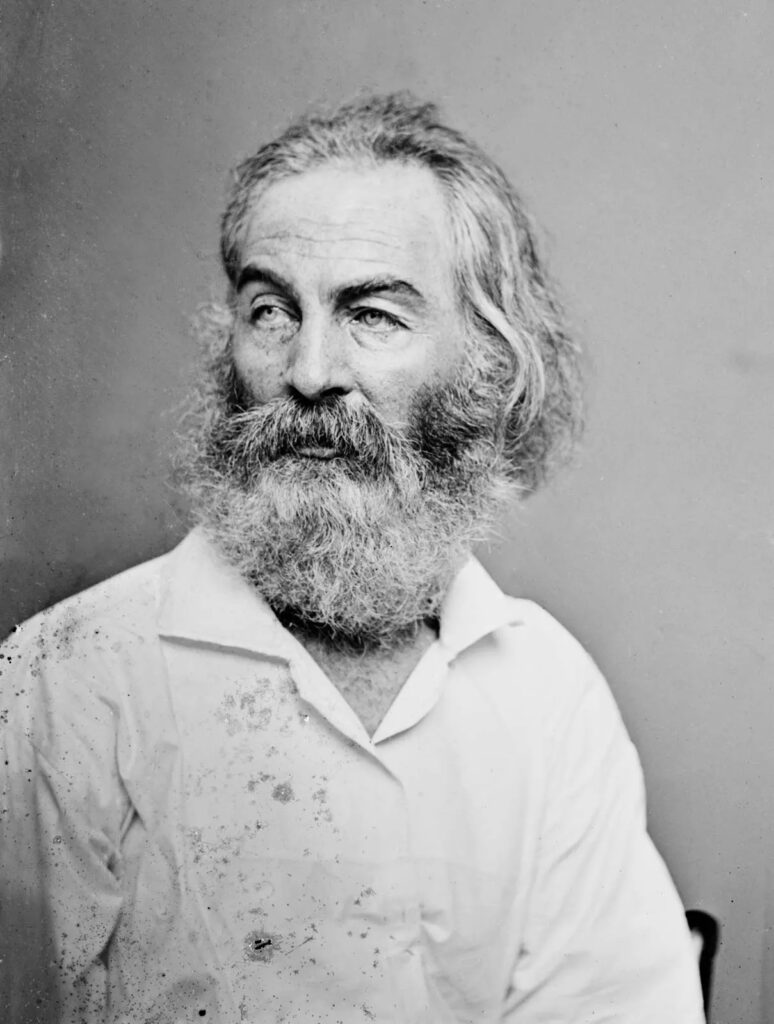Walt Whitman
Walt Whitman, an iconic figure in American literature, was born on May 31, 1819, in West Hills, New York. He is widely celebrated for revolutionizing poetry with his free verse style and remains a pivotal figure in the American literary canon. Whitman’s seminal work, “Leaves of Grass,” first published in 1855, is renowned for its celebration of democracy, nature, love, and friendship, deeply reflecting his personal philosophy and views on American society.

Raised in a Quaker family, Whitman’s early experiences in Brooklyn and Long Island provided a rich backdrop that influenced his later writings. Despite leaving formal education at the age of eleven to work in the printing and journalism fields, Whitman’s passion for reading and self-education shaped his development as a writer. His career in journalism helped refine his style and increase his exposure to the social issues of his time, which he addressed throughout his works.
During the American Civil War, Whitman worked in hospitals in Washington D.C., caring for the wounded, which profoundly impacted his writing and led to some of his most famous poems, including “O Captain! My Captain!” and “When Lilacs Last in the Dooryard Bloom’d,” both lamenting the assassination of Abraham Lincoln.
Whitman’s poetry often focused on the individual soul and the human spirit, transcending the societal norms of his time. His work celebrated the potential of the individual and the collective spirit of America, blending transcendentalism and realism in ways that were groundbreaking for the period. His literary style and thematic choices helped to lay the groundwork for both modernist and postmodernist movements.
Whitman continued to revise and expand “Leaves of Grass” throughout his life, striving to capture the evolving American experience. He died on March 26, 1892, in Camden, New Jersey, but his legacy endures, influencing countless poets and writers and continuing to be studied for its innovative style and profound content.
For more detailed exploration of Walt Whitman’s life and works, his biography on the Poetry Foundation and Britannica are excellent resources:
SOME PUBLISHED WORKS
Walt Whitman published a variety of works during his lifetime, with his poetry leaving a significant impact on American literature. Here are some of his notable published works:
- Leaves of Grass (1855) – This is perhaps Whitman’s most famous work, initially published in 1855 and continually revised and expanded in several editions throughout his life. It includes poems such as “Song of Myself,” “I Sing the Body Electric,” and “Out of the Cradle Endlessly Rocking.”
- Drum-Taps (1865) – A collection of poems written during the American Civil War, reflecting Whitman’s experiences and views on the war.
- Sequel to Drum-Taps (1865-1866) – Following the assassination of President Abraham Lincoln, Whitman published this sequel, which includes “When Lilacs Last in the Dooryard Bloom’d,” a poem mourning Lincoln’s death.
- Specimen Days & Collect (1882) – This is a collection of prose that includes journal entries, memoirs, and observations, giving insight into Whitman’s thoughts and experiences beyond his poetry.
- Democratic Vistas (1871) – An essay published after the Civil War, discussing the role of democracy in America and its potential, reflecting his disillusionment with the state of the nation at the time.
- The Wound-Dresser (1898) – A collection of articles written by Whitman during his time as a nurse in the Civil War, reflecting on the experiences and sufferings of the wounded soldiers he cared for.
These works showcase Whitman’s innovative use of free verse and his exploration of themes such as democracy, nature, love, and the human spirit. His style and thematic choices helped to define a distinctly American voice in the world of poetry.
For more detailed information on his works and their historical context, visiting resources such as the Walt Whitman Archive can provide comprehensive insights.
QUESTIONS FOR FURTHER DISCUSSION
- Exploration of Free Verse: How did Walt Whitman’s use of free verse in “Leaves of Grass” influence the structure and rhythm of modern American poetry? Consider how his style contrasts with the structured forms of his contemporaries.
- Themes of Democracy and Individualism: How do Whitman’s poems reflect his views on democracy and individualism? Discuss how these themes are expressed in his works and their relevance in today’s context.
- Whitman’s Vision of America: In what ways did Whitman’s poetry contribute to the construction of an American identity? Analyze poems that depict his vision of America and discuss how they resonate with the ideals of the American spirit.
- Impact of the Civil War on Whitman’s Writing: How did Whitman’s experiences during the Civil War influence his poetry? Explore his writings from this period and discuss how they address themes of suffering, healing, and national unity.
- Innovations in Content and Theme: Whitman often included controversial topics and sensuality in his poetry that challenged societal norms of his time. How did this affect the public and critical reception of his work both during his life and posthumously?
- Whitman and Transcendentalism: Although not a formal member of the Transcendentalist movement, Whitman’s work shares many of its ideals. Discuss how transcendentalist themes of nature, the soul, and individualism appear in his poetry.
- Literary Legacy and Influence: Consider Whitman’s influence on later generations of poets and writers. Which modern poets have cited Whitman as an inspiration, and how is his influence evident in their work?
- Whitman’s Prose Works: Besides his poetry, Whitman also wrote essays and prose. How do these writings complement his poetic themes and what do they reveal about his broader literary and philosophical concerns?
These questions can foster a deeper understanding of Walt Whitman’s contributions to literature and how his works continue to influence the fields of poetry and American cultural studies.
© 2024, wcadmin. All rights reserved, Writers Critique, LLC Unless otherwise noted, all posts remain copyright of their respective authors.




